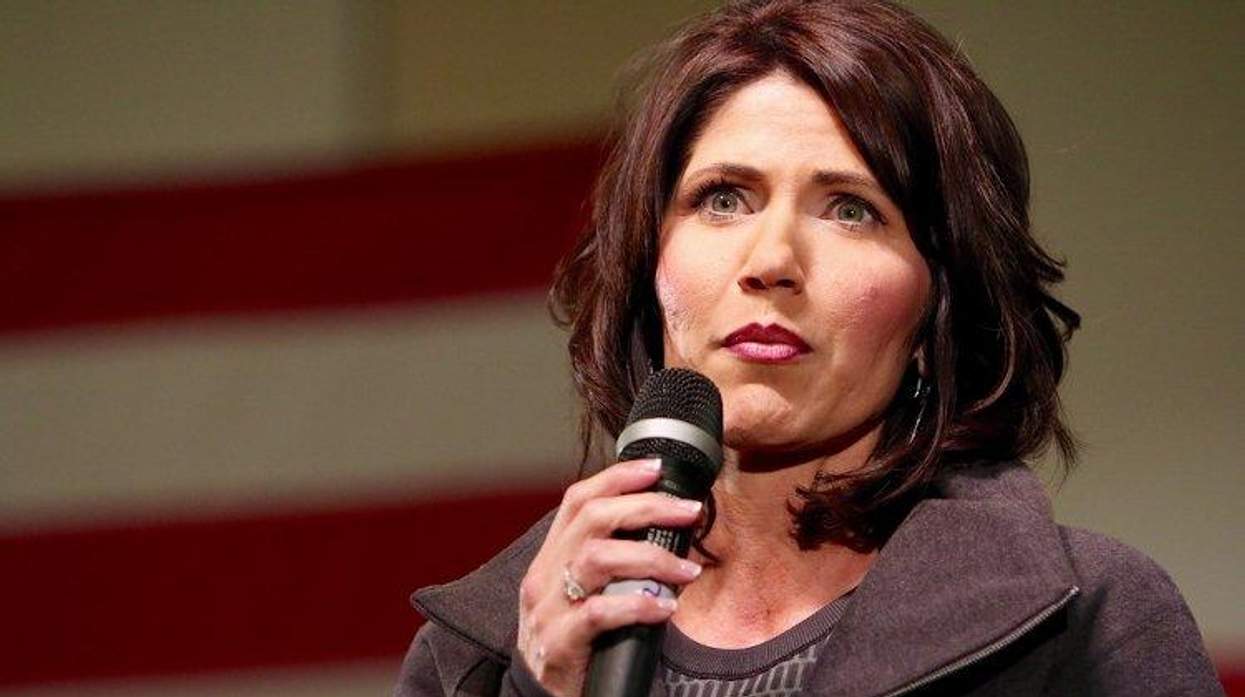Now that the South Dakota legislature has declined to make the changes Gov. Kristi Noem demanded in an anti-transgender sports bill, Noem has issued her own anti-trans policy via executive order.
House Bill 1217, passed by both legislative chambers, would have kept transgender girls and women out of sports designated for females at the state's public schools, colleges, and universities. Noem, a Republican who initially expressed enthusiasm for the measure, sent it back to lawmakers, saying she wanted colleges and universities exempted. This was largely because she feared boycotts by businesses and the National Collegiate Athletic Association.
She also announced she was forming a national coalition called "Defend Title IX Now" to oppose trans inclusion in athletics, because when enough states stand together, the NCAA "cannot possibly punish us all." She claimed her motivation wasn't anti-trans but that she simply wanted to protect women's sports, language that is being used frequently to justify trans-exclusionary policies. Title IX of the Education Amendments of 1972 is the federal law banning sex discrimination in educational programs, including sports.
Noem's refusal to sign the original bill has brought her criticism from the right, and the bill was declared dead Monday after lawmakers refused to make the changes she called for. Noem's demand was, in the state's parlance, a "partial veto," but legislators treated it as an outright veto and failed to come up with the two-thirds majority needed to override it, the Associated Press reports. But she followed up with two executive orders, one governing K-12 public schools and the other one covering state colleges and universities.
Both decree that "only females, based on their biological sex, as reflected on their birth certificate or affidavit provided upon initial enrollment," may participate in girls' or women's sports. The South Dakota Department of Education is tasked with implementing the policy for K-12 schools, the Board of Regents for state colleges and universities.
In a tweet announcing the executive orders, Noem also said she planned to schedule a special legislative session to deal with this issue as well as medicinal marijuana, something else that has been the subject of contention in the state.
South Dakota conservatives denounced the orders as "political face-saving," the AP reports. Republican Rep. Rhonda Milstead, sponsor of the original bill, said the governor's action sent "a weak message."
So far this year, trans-exclusionary sports bills have been signed into law in Arkansas, Tennessee, and Mississippi. Last year Idaho enacted such a law, but it has been blocked by a federal judge while a court challenge proceeds.
Similar bills are pending in several other states, part of a rash of anti-trans and more broadly anti-LGBTQ+ legislation introduced around the nation. A total of 174 anti-LGBTQ+ bills have been introduced, with a record 95 of the bills aimed specifically at trans people, according to the Human Rights Campaign. Of the anti-trans bills, about half seek to bar trans athletes from the school sports teams designated for their gender identity, while many others seek to keep trans minors from receiving gender-affirming medical care. Arkansas is the only state where a bill addressing medical care has been passed by both legislative houses; it remains to be seen whether Gov. Asa Hutchinson will sign it.
The sports bills are based largely on the belief that trans girls and women have an inherent and unfair advantage over cisgender females because of body size and testosterone levels. Scientists and activists dispute this, saying there are many other factors that can give an athlete an advantage, and that there is no widespread dominance of women's sports by trans competitors, who have been allowed in college sports and the Olympics for years. Most of the politicians backing these bills can't name a single instance in which trans female athletes caused a problem in their state. The South Dakota High School Activities Association, which opposed HB 1217, has approved only one trans youth to compete in interscholastic sports over the past decade. Plus these bills further marginalize trans young people, who already face much discrimination.
Human Rights Campaign President Alphonso David issued a statement condemning Noem's action. "Rather than listening to the experts, families and business leaders in South Dakota who have pushed back against the legislature's attempts to pass HB 1217 over the past few weeks, Gov. Kristi Noem clarified her anti-transgender agenda by signing two executive orders this afternoon," he said. "Numerous federal courts have found that transgender students are included under Title IX. Additionally, the United States Supreme Court confirmed this summer in the Bostock ruling that transgender people are covered by existing federal nondiscrimination law. Noem's executive orders show where her true priorities lie -- playing politics with children's lives in the middle of a pandemic. These orders cannot withstand legal scrutiny. Transgender kids are kids, and they deserve the right to live full lives free from abuse, stigmatization, and danger."




































































Charlie Kirk DID say stoning gay people was the 'perfect law' — and these other heinous quotes